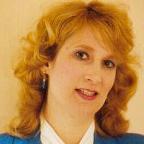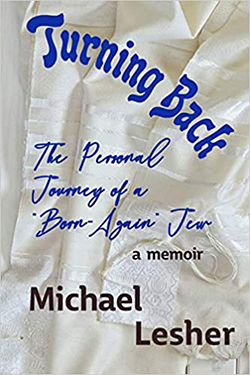Turning Back: The Personal Journey of a “Born-Again” Jew, A Memoir by Michael Lesher; Lincoln Square Books

FORT LEE, New Jersey — I have known Michael Lesher since 1995. I had first learned his name when reading an op-ed in The Jewish Week in the wake of the assassination of former Israeli Prime Minister Yitzchak Rabin. At the time his name was completely unknown to me. Yet, I felt compelled to make contact with him right away, and I did. His op-ed on the tragic assassination of the former Israeli Prime Minister – at the center of contentious peace negotiations which many Israelis saw as betrayal to the settlers and religious community life – was far different than any column I had read on the assassination. In his column, he went beyond the surface to dig deeply into some of the less socially desirable aspects of educational institutions that had incited the assassin, Yigal Amir, to take the life of Rabin. For Michael, whose name was not well known in the Jewish writing circles, this took courage: he put the social moorings of Amir on trial and politically “incorrectly” questioned the institutions where Amir had been exposed to pernicious thoughts that spurred this act of murder. I found his penetrating level of analysis, though certainly unpopular in certain circles, to be enchantingly refreshing. It was good “brain food” for me as a reader. Over the years we co-authored chapters and articles examining institutions of religious life, earning us the 2010 Pro Humanitate Literary Award from the North American Resource Center for Child Welfare.
I held the first three chapters of Turning Back in my hands in 1997. There were only three chapters written at that time. Yet, I knew someday I’d be holding this work between its covers, for I felt the prescient weight of the book resting in my hands at the time. I went ahead and encouraged Michael to develop this work into a full-fledged memoir. Taking pen in hand the thoughts poured out of him, composing one of the most illuminating and gifted memoirs I’ve ever read. I paired Michael with literary agent, Peter Rubie, who I had met many years ago. Together they made music. Peter, whose background is in investigative journalism, made Michael his subject, digging deeper and deeper into the memoirist’s unconscious thoughts. This was not an easy process for the author, for at times it was as arduous as deep psychoanalytic probing into the painful regions of human consciousness. To answer Rubie’s many editorial questions, Michael had to plow through his personal memories, his reflections, his reactions, and his analyses just in order to find the real truth behind the words. The memoirist had to reach his deepest level of literary expressiveness, a condition precedent for writing the story of his own coveted decision to journey back to the richness and fullness of religious life as set forth in the Jewish tradition of thousands of years.
Turning Back is a story of the simultaneity of life’s journeys, which are never straightforward linear paths for any of us even though we often delude ourselves into thinking so. As a child Michael experienced the acidity of the segregationist South. His father, Stephan Lesher, was a Newsweek correspondent, author, biographer (of Alabama governor George Wallace), whose support for civil rights stood out like a sore thumb in deep-South environments like Columbus, Georgia, where Michael was born in 1958.
Yet for all of his father’s passions about social justice, Michael grew up in a “tepid” Jewish home. Jewish law and tradition were off in the background; there was sparse discussion of the passions that envelop Jewish family life.
I met Michael’s younger brother, Joe, in 2005 when I was in Arizona for part of the summer. Joe offered to take me out to dinner. Over a nice vegan meal, Joe pushed his chair back, looking at me across the table, and inquisitively asked me as Michael’s colleague and co-writer to “explain” Michael’s journey back to Orthodoxy. He still appeared incredulous after all these years that his older brother would embrace a somewhat odd existence that was “not understandable” to him or his mother. Joe was inquisitive about Michael’s embrace of Orthodoxy, his raising of his children in the religious community, his yearnings and desires, and lastly his facility with learning the Talmud when he had a very scant Hebrew school education. He described Michael to me as “a genius,” pointing out that he would as the eldest child spontaneously construct complex games for his younger siblings to keep them mentally occupied when the weather kept them indoors. I didn’t have satisfactory answers for his brother at the time. It was hard to put myself in Michael’s shoes and answer the questions honestly.
I know now that Joe will have his questions answered when turning the pages of his brother Michael’s memoir – a gift to every reader who has been at the crossroads, once, twice, thrice, or always, for life is a continual journey forward and backwards. We are blessed to have the Jewish Tradition, emanating from a composite of questions, commentaries and reflections, cultivated by our Sages and rabbinic scholars over thousands of years. We are equally blessed to have this modern-day memoir that explores, examines and questions with penetrating acuity some of the most fundamental values of Jewish life that most of us don’t have the time to inspect. Michael’s memoir is true to Jewish tradition, as it asks more questions than it answers. It stimulates one’s mind and stirs one’s heart so that we can begin travel on our own peregrination back to our Jewish roots. For that alone it is an important read, as it serves as the catalyst for introspection in our own personal journeys.
“
Amy Neustein, Ph.D., is editor of Tempest in the Temple: Jewish Communities and Child-Sex Scandals (Brandeis University Press, Series in American Jewish History, Culture and Life). She resides in Fort Lee, NJ.
